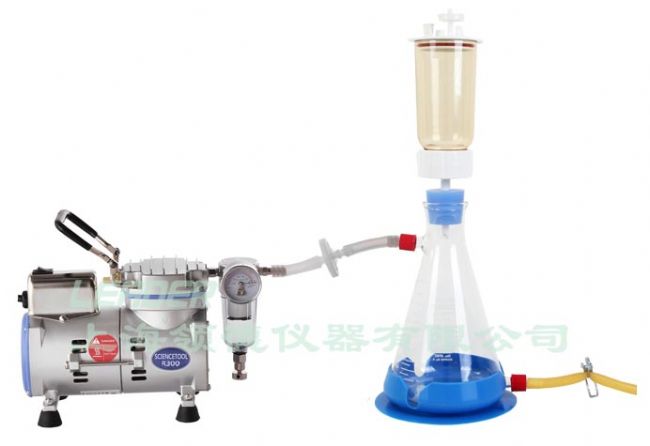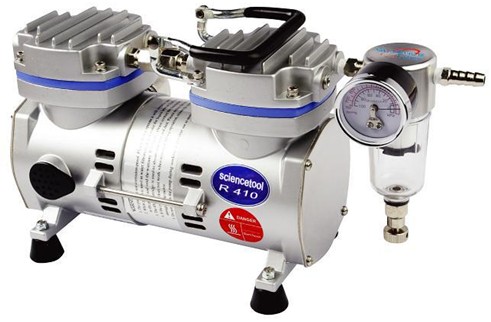
Privacy statement: Your privacy is very important to Us. Our company promises not to disclose your personal information to any external company with out your explicit permission.
The vacuum suction filter device is an instrument for solid-liquid separation. The suction filter device used in the laboratory is often used for clarification or sterilization filtration of samples, collection of microorganisms, suspended matter and particulate matter in a solution for subsequent detection. Such as medium reagent sterilization filtration, microbial limit inspection filtration, suspension solids inspection filtration, mobile phase solvent clarification filtration and the like. Many customers will have many questions or problems in the early stage selection, after purchase and long-term maintenance. For example, if the suction filter device is to be equipped with a vacuum pump, the suction filter will suck back and the liquid will suck into the pump. How to solve the problem after the sucking problem? This article will briefly analyze the common questions that these users encounter in a question and answer format.
Q: Is the suction filter unit used with a single suction pump?

The complete suction filter unit is equipped with a pump, and the suction pump can greatly increase the filtration speed.
A: Because the filter membrane, filter paper, filter cloth or filter screen is needed for filtration, the smaller pore size will cause great resistance to the liquid passing through the filter membrane. At this time, the vacuum pump is needed to draw the bottom of the suction filter bottle into a vacuum state. , forming a pressure difference between the inside and the outside, the outside atmospheric pressure will squeeze the liquid through the filter. If the suction pump is not used, the filtration rate will be very slow, and almost no filtrate will pass through the filter. Therefore, the suction pump is a necessity for a complete laboratory pumping equipment.
Q: What kind of pump should I use with suction filtration? Can the water circulation pump and the oil pump be used?

Oil-free suction pump R410 suitable for use with suction filter bottles
A: The filter bottles and suction bottles are connected by hoses. Usually, special vacuum pumping pumps are used. These pumps are oil-free. It does not pollute the filtered filtrate, and the pump and the oil pump have the problem of medium suction. In addition, the oil-free design of the suction pump can be used for plugging. There is no restriction on the place of use, unlike the pump. Used nearby. The R300 oil-free suction pump is recommended here. It is very compact and suitable for suction filtration. In addition, the R300-DC of the R300 can be connected to the power supply of the car cigarette lighter for pumping in the field.
Q: Why does the liquid get sucked into the pump during suction filtration?
Answer: The filtrate is sucked into the pump, which is commonly called back suction. This is a phenomenon that filtration or liquid absorption experiments have been plaguing customers. There are two main reasons: some suction filter bottles have too close to the suction port and the suction port, and the filtrate is sucked into the pump along the airflow; the liquid level of the liquid collection bottle is too high, the filtrate is not poured out in time, and the liquid is too slow to be sucked into the pump. .
Q: How to avoid the problem of sucking up during suction filtration?
A: In addition to the use of personnel to observe the liquid level and promptly dump the filtrate this morning, there are 3 ways to avoid such problems:
1. Adopt a pumping filter bottle with reasonable structure design. For example, the R300P vacuum suction filter device has a float valve inside the liquid collection bottle. The liquid is too full to close the suction port, and the distance between the lower liquid inlet and the suction port is far away, and the liquid cannot be sucked in the direction of the air flow. However, such suction filter bottles are often made of plastic mold-opening due to their complicated structure, and are not suitable for organic solvents or samples with strong corrosiveness. It is only suitable for suction filtration of aqueous samples such as microbial limit test and SS suspension filtration.

The SB-4510 has a 2-hole aspiration cap that can be connected to a suction pump and a suction filter bottle. The bottle is a common reagent bottle for easy replacement.
2. Use a buffer bottle. This is a relatively traditional method, the price is cheap, the buffer bottle can also be used repeatedly. The SB-4510 buffer bottle is recommended. The special bottle cap is designed with 2 suction ports. The thread can be used with the laboratory's common blue cap reagent bottle. It is easy to use and use the reagent bottles with different capacity. If the bottle is broken, you don't need to buy it. You can take it with the reagent bottle. A single buffer bottle is like an ordinary suction bottle and does not completely eliminate the sucking phenomenon.

Water blocking filter can completely eliminate the sucking
3. Water blocking filter. BS-02250 water blocking filter is a solution to completely eliminate the back suction problem. It has a built-in hydrophobic filter membrane, which can pass the gas and can prevent liquid from sucking up. This is the most thorough solution.
Q: How to solve the problem once the sucking?
A: If a small amount of liquid is inhaled, do not turn off the vacuum pump immediately, but unplug the tube connected to the suction filter bottle and continue to pump air, and the water vapor will be discharged. Do not continue to use a large amount of liquid inhalation, contact the after-sales service.
E-mail naar dit bedrijf
January 03, 2024
January 03, 2024

Privacy statement: Your privacy is very important to Us. Our company promises not to disclose your personal information to any external company with out your explicit permission.

Fill in more information so that we can get in touch with you faster
Privacy statement: Your privacy is very important to Us. Our company promises not to disclose your personal information to any external company with out your explicit permission.